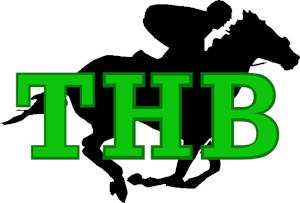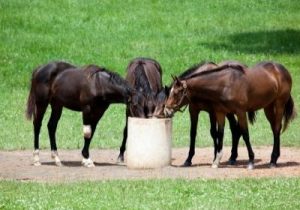A race horse’s diet is very important in making sure the horse is able to run at its fastest. Certain foods contain nutrients that can help increase a horse’s energy and stamina. Oats are a good source of carbohydrates, which can give a horse energy. Hay is a good source of fiber, which can help a horse’s digestive system. But that’s just the beginning if we’re feeding a horse to increase its speed.
The right type of food for a racehorse
While all racehorses require a diet that is high in protein, carbs and vitamins, the specific mix of these ingredients will vary depending on the horse’s age, weight, condition and training schedule.
For example, a yearling colt (baby horse) will need more protein to support muscle development than an adult horse in training. And a horse in heavy training will need more calories and carbs for energy than one that is retired from racing.
As a rule of thumb, racehorses should get about 10-15% of their daily calories from protein, 60-70% from carbs and 20-30% from fat. But the exact mix will be tailored to the individual horse’s needs by a team of trainers, vets and nutritionists.
The type of food a racehorse eats can also make a difference in performance. For example, hay is a good source of slow-burning complex carbs that can give horses sustained energy over long distances. Oats are another popular choice because they are rich in soluble fiber, which can help horses feel fuller for longer and prevent them from getting tired too easily.
Supplementing a race horse with electrolytes can also positively impact its race performance, particularly if the horse has had a race or hard workout closely before an upcoming race. Electrolytes substantially reduce cramping and help with mental acuity and conversion of food energy into muscle energy.
The right amount of food
While it is important to give a racehorse the right amount of food, it is also important to make sure that the food is of good quality. Racehorses need a diet that is high in protein and low in carbohydrates. The best way to get this kind of diet is to feed them a mix of hay and grain. The hay should be high quality and the grain should be freshly milled. Avoid giving them any processed foods or foods that contain chemicals.
The Right Time to Eat
Many people believe that race horses run faster when they have food in their stomachs. However, this is not always the case. Race horses actually run fastest when they are slightly hungry. This is because their intestines are empty and they can store more glycogen, which is a type of energy that the horse’s muscles use.
Before the race
As any trainer will tell you, what a horse eats before a race can be just as important as what he eats the rest of the time. The goal is to give the horse enough energy to perform at its best without overloading the stomach.
Most trainers recommend that a horse’s last meal be given about four hours before the race. This will give the horse time to digest his food and convert it into energy, but won’t leave him feeling uncomfortably full.
If fed at all, a regular concentrate-only diet should be given at least five hours before a race, preferably more. A little (1 to 2 lbs.) meal of sweet feed consumed one to two hours before to the race can cause elevated levels of blood sugar and insulin if warm-up time is relatively brief.
It is better to eat often spaced-out small, diverse meals made of grains that are heavy in lipids, protein, and carbs. Feeding your horse starchy foods four to five hours before to the race can help it use its energy more efficiently.
If the race is early in the day, an early morning meal may be necessary; if the race is late in the day, a light dinner may be sufficient.
There are a few things to avoid giving a horse before a race. Meals high in fat or sugar can give a horse an energy “high” followed by an energy “crash,” which is not ideal for competition.
This video should help understand what makes racehorses run so fast:
Other Factors
Feed, water, climate, rests, exercise, and shoes are other important factors that affect a racehorse’s performance. While the most important factor is the food the horse eats, these other factors should not be ignored.
The horse’s age
When a horse is young, their bones are still growing and they are not yet fully mature. For this reason, younger horses require more food than older horses. As a horse ages, their metabolism begins to slow down and they do not require as much food to maintain their weight.
The horse’s health
In order for racehorses to maintain peak performance, they must be in excellent health. This means that they should be free of injuries and illnesses, and they should be well-nourished.
One important factor that can affect a horse’s performance is the level of exercise that they get. If a horse is not given enough exercise, they will not be able to maintain their muscle mass and will start to feel sluggish.
On the other hand, if a horse is given too much exercise, they can become overworked and tired, which can also lead to poor performance. It is important to find a balance that works for each individual horse.
Another factor that can impact a horse’s performance is the amount of rest that they get between events. Horses need time to recover from strenuous exercise, and if they do not get enough rest, they will not be able to perform at their best. It is important for competitive racehorses to have a training and racing schedule that allows for adequate rest periods so that the horse can stay healthy and perform at its best.
The weather
In cold weather horses burn more calories to stay warm, and their blood is thicker. This requires more calories, and more grains in general.
In hot weather it’s not necessary to feed as much, but horses need quite a bit more water.
What is the best food for a racehorse?
Clean grass hay, such as timothy or oaten hay, should be given to racehorses at a rate of 15-20 lb (7-9 kg) each day. Alfalfa hay in smaller amounts (2-4 lb or 0.9 to 1.8 kilogram per day) may also be provided. This amount of hay consumption will satisfy the racehorse’s maintenance DE needs and aid in preventing colic and stomach ulcers.
FAQs About Food for Racehorses
What do Olympic horses eat?
The majority of Olympic horses consume grass hay. Timothy hay from the U.S. northwest is very palatable and has an ideal nutritional profile for performance horses (10% protein, 34% ADF, 57% NDF).
What is a good mix of grain for horses?
Oats, maize, and barley are the most widely grown. Other grains given to horses include wheat and milo (sorghum). Oats, barley, and maize may all be offered as whole grains, although many are usually treated to make them more digestible.
What foods give horses energy?
Starch is a carbohydrate found in cereal grains like barley, maize, and oats. It is a strong source of quick-release energy and is especially helpful for horses who perform hard for brief periods of time.
What’s the best hay for racehorses?
- The best hay for horses is alfalfa, which is high-protein legume hay from the “pea” family.
- Clover is another legume hay that is good for racehorses.
- Timotheus grass
- Orchardgrass
- Fescue
- Reed canary grass
- Bluegrass
- Bromegrass
Can you feed raw eggs to a racehorse?
As long as the horse doesn’t object, most equine experts agree that combining eggs with feed increases its nutrition value in a natural way. Egg are a great source of protein. Because eggs contain the perfect ratio of amino acids, their protein content is remarkable.
Can horses eat bread?
Bread contains a lot of starch and may cause laminitis and founder in horses with equine metabolic syndrome and insulin resistance. There are far better options for equine feeds, so even while many foods, like bread, are not hazardous to horses, it is still not a good idea to give it to them.
Is barley or oats better for racehorses?
By weight, barley offers more digestible energy and total nutrients than oats, but it falls short of maize in terms of these nutrients. Because barley is less prone to promote “hot” behavior than oats, many horse owners prefer it.
Is corn or oats better for racehorses?
When feeding large quantities oats are the safest feed option since their starch is more easily absorbed in the small intestine than maize starch. Oat starch lowers the possibility of hindgut acidosis, which is brought on by starch entering the hindgut and quickly fermenting there.
Which is better for horses whole oats or rolled oats?
Oats that have been entirely flattened and rolled are thought to be simpler for horses to consume. The most nutritious choice is hulled oats, which are devoid of the husks and consist entirely of oat seed. Oats that have been crushed have both the hull and the grain itself broken up into tiny pieces.
Conclusion
Leading racehorse trainers feed their horses a diet that consists of oats, hay, and alfalfa. The food they eat is meant to increase the horse’s energy levels and endurance.
Thoroughbreds are fed a diet of oats, hay, and apples. The oats provide energy while the hay is important for digestion and the apples help to prevent inflammation in their stomachs. Reference: thoroughbred feeding guide.
Related Tags
- feeding racehorses on race day
- what do race horses eat joke
- what kind of food does a racehorse eat riddle
- race horse feed mix
- feeding race prospects and racehorses in training

I am Lawrence (aka “The Horse Better”). I spent 20+ years in financial risk management where I ran large-scale statistical betting models in complex situations. I grew up around horses and I’ve been betting on horse races for about 10 years with good success. I hope my articles provide good value!

